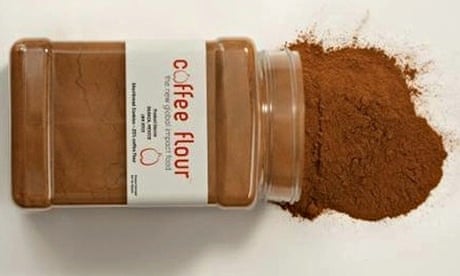Dan Belliveau is not a coffee guy. He is an engineer who has helped design factories for General Motors, Frito-Lay and Starbucks, among others. At the coffee giant, while helping to automate roasting and packing plants, he stumbled upon a big problem: coffee waste.
Specifically, Belliveau learned that billions of pounds of reddish pulp, known as coffee cherry, are left over after coffee beans are extracted from their shells. Some discarded pulp is used to make tea, some is worked back into the soil as fertilizer, but most of it piles up around coffee mills and pollutes nearby waterways.
Why, Belliveau wondered, couldn't the waste be made into something useful?
His questioning eventually led him to invent coffee flour – a nutritious, gluten-free meal, made from coffee cherry, that can be baked into cookies, brownies, granola, candy corn and even chocolate. If coffee flour becomes a success, it could help solve an environmental problem, supplement the income of coffee farmers and deliver nutrition to a hungry world.
Of course, people invent new things every day, and most come to naught. But Belliveau is worth taking seriously, in part because of the supporters he has attracted. After two years in development, Coffee Flour was officially launched this month by Belliveau and Intellectual Ventures, the Seattle company led by Nathan Myrhvold that helps inventors commercialize their ideas. Microsoft's former chief technology officer, Myrhvold is also an accomplished cook and co-author of the five-volume 2,438-page cookbook Modernist Cuisine: The Art and Science of Cooking.
Belliveau's startup company, CF Global, has also secured investment from two coffee industry giants, ECOM Agroindustrial Corp, a Swiss-based firm that is one of the world's largest coffee millers and traders, and Mercon Coffee Corp, a major trading firm with roots in Nicaragua and operations in Mexico and Vietnam.
Belliveau's invention has also drawn attention in the kitchen. Jason Wilson, the award-winning chef at Seattle's Crush restaurant, has already used coffee flour in recipes for gnocci, coffee cakes, waffles, brioche, french toast, dusted lamb and dusted duck.
On the coffee flour website, Wilson writes:
From flavor to consistency to backstory, coffee flour is the rarest thing I've ever cooked with. Customers really love learning about the benefits of coffee flour and discovering how to incorporate a multi-purpose ingredient into new recipes. But the most exciting part is how seduced and fanatic they get by the robust flavor, which was unexpected.
I asked Ben Packard, who led Starbucks' corporate responsibility efforts for many years and worked with Belliveau, for his reaction. "Dan's a really sharp guy," Packard told me. He confirmed that coffee waste is a significant environmental worry because discharges of organic pollutants from coffee mills into waterways can rob aquatic species of essential oxygen.
That said, Belliveau and his partners will need to scale up both supply and demand to build a real business. On the supply side, like many recycling operations, they'll have to find a way to efficiently collect a waste product that is widely dispersed.
Belliveau's plan is to dry the wet waste at the mills, process some of it in the country of origin and export the rest. "We'll rely on the coffee supply chain because they have figured out how to get dry beans to the rest of the world," he says.
This year, CF Global will produce about 350,000lbs of flour from coffee grown in Hawaii, Nicaragua, Guatemala, Mexico and Vietnam. That's a fraction of the estimated 10 to 15bn pounds of coffee waste generated each year, Belliveau told me: "If five years from now, we're selling 200m pounds a year, it's a nice business but it's not solving the problem."
On the demand side, Belliveau hopes that the nutritional profile of coffee flour will generate wide appeal. An ounce of coffee flour has more fiber than whole grain wheat flour, more iron than spinach, more potassium than a banana and more protein than fresh kale, the company says. "We see a huge Asian market for this," Belliveau says. "They're going to be requiring more and more protein."
But what about taste? There, Intellectual Ventures has been a big help, using its labs and kitchens to test various formulations of coffee flour. One of the company's employees, Chris Allegro, a PhD. physicist and former Microsoft executive who manages IV's invention development fund, has worked closely with Belliveau on the product.
"I've tasted a lot of it," Allegro told me."It really doesn't taste like coffee. It's a unique flavor. The first thing that jumped out at me was dark fruit."
Intellectual Ventures kindly sent me samples of coffee flour, baked into brownies, shortbread cookies, granola, chocolate and caramel corn. I'm no fan of caramel corn, but the coffee flour added a rich and earthy flavor to the baked goods and the chocolate. Belliveau and Intellectual Ventures plan to offer the ingredient first to chefs, then to specialty baking companies and chocolatiers, and eventually to the big North American food companies for use in cookies or pancake mix.
In theory,coffee flour could be worked into local products like tortillas in Latin America, noodles in China or Japan, and naan in India. Says Belliveau: "We want to be the Intel inside."
The circular economy hub is funded by Philips. All content is editorially independent except for pieces labelled advertisement feature. Find out more here.
Join the community of sustainability professionals and experts. Become a GSB member to get more stories like this direct to your inbox
